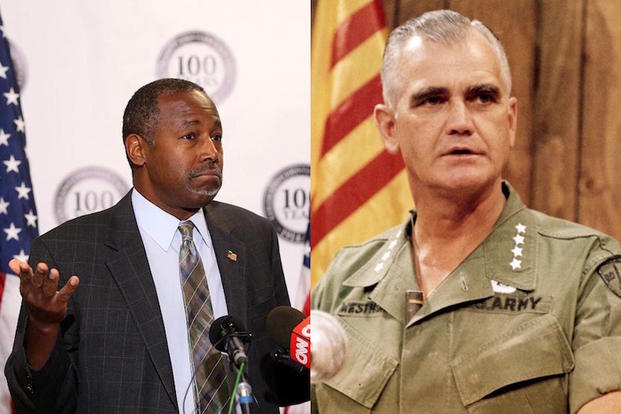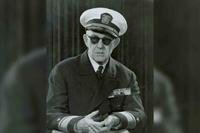Dr. Ben Carson's campaign for the Republican presidential nomination has been gaining momentum lately and much of the political outsider's appeal is based on the compelling life story he told in his 1996 autobiography Gifted Hands. Carson grew up in poverty in Detroit and won admission to Yale before becoming a respected pediatric neurosurgeon. One of the key stories in that book is his decision to forego a "full scholarship" to West Point, an offer that supposedly came after Carson met General William Westmoreland after a Detroit Memorial Day parade in 1969.
"I was offered a full scholarship to West Point," Carson wrote in the 1996 book. "I didn't refuse the scholarship outright, but I let them know that a military career wasn't where I saw myself going. As overjoyed as I felt to be offered such a scholarship, I wasn't really tempted."
He confirmed the story earlier this year in an interview with Charlie Rose, saying “I was offered a full scholarship at West Point, got to meet General Westmoreland and go to Congressional Medal of Honor dinners. But decided really my pathway would be medicine.”
That story started to unravel this week after the media started looking into the candidate's life story. Gen. Westmoreland's records suggest that he was in Washington for Memorial Day in 1969. Anyone close to the Army knows that there's no such thing as a "scholarship" to the United States Military Academy: all cadets receive tuition, room and board in exchange for their commitment to future military service. West Point says they have absolutely no record that Carson was admitted or that he even applied to the service academy.
The campaign has now backed off the story and admitted that the candidate received no such offer.
Was Carson encouraged by his ROTC command to pursue an appointment and did that encouragement somehow in his mind become guaranteed admission as he told the story over the years? It's safe to say that exaggerating one's military service has long been a popular pastime for Americans: everyone knows someone who's got war stories that don't quite check out. Should voters forgive a candidate for trying to enhance his connections to military service?
Or should we see Carson's admittedly false claims as an affront to the men and women who actually pursed those military careers, gained admission to West Point and went on to serve their countries? There's a big difference between "They wanted me, but I said no" and actually making the commitment.
Where do you stand on Carson's claims about West Point? Sound off!




